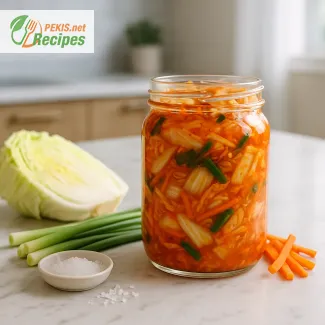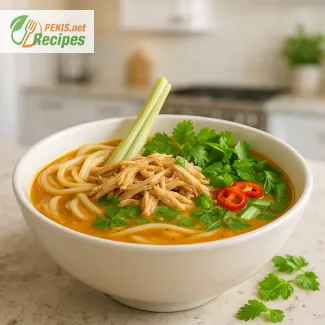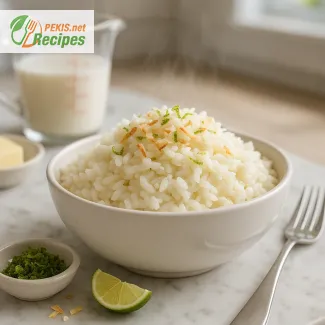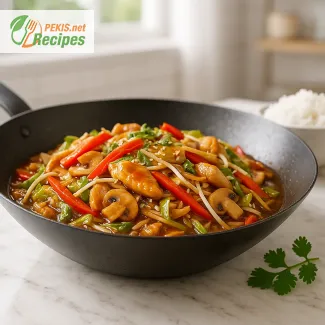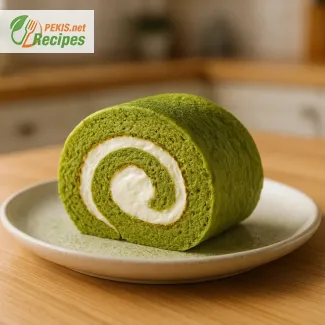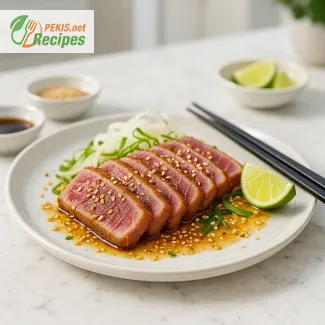Chow Mein for 4 servings, ready in 20 min prep + 15 min cook (35 min total). Stir-fried egg noodles, tender chicken, crisp cabbage, carrots, and bell peppers coated in a savory soy-oyster sauce. A quick, versatile noodle dish with rich umami flavor and fresh texture, perfect for busy weeknights or family meals.
PEKIS – professional chef and recipe developer with more than 25 years of experience, specialized in European and international cuisine. For this Chow Mein, the focus is on turning simple noodles, fresh vegetables, and tender chicken into a quick and flavorful dish that feels both homely and restaurant-worthy.
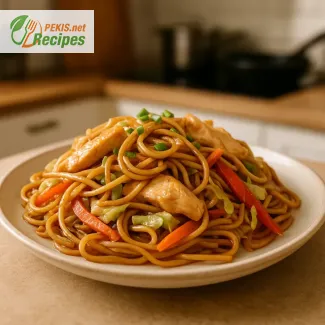
Irresistible Chow Mein for Everyday Cooking
A comforting noodle dish with timeless appeal
Golden strands of stir-fried noodles coated in a savory sauce, crisp vegetables that still keep their bite, and tender strips of chicken, beef, or shrimp—this is what makes Chow Mein one of the most beloved noodle dishes worldwide. Its balance of flavors and textures makes it suitable for both a quick weeknight dinner and a dish you would proudly serve to guests. When prepared at home, you have full control over the ingredients: you can load it with seasonal vegetables, adjust the amount of soy sauce for the perfect balance of saltiness, or spice it up with chili for extra heat.
Origins and cultural influence
The story of Chow Mein goes back to northern China, where the term “chow mein” literally means “stir-fried noodles.” As Chinese immigrants moved across continents, they brought this dish with them, adapting it to local ingredients and tastes. In the United States, it gained popularity in the early 20th century, becoming a staple in Chinese-American restaurants. In Europe, Chow Mein entered through Chinatowns and quickly found its place on family tables, valued for its speed, taste, and adaptability. Its global appeal lies in its ability to be both traditional and flexible, a dish rooted in history yet constantly evolving.
Key elements of authentic Chow Mein
- Noodles: Thin egg noodles or wheat noodles are the base; they should be parboiled, drained, and then pan-fried until lightly crisp.
- Protein: Versatile options include chicken, pork, beef, shrimp, or even tofu for a vegetarian version.
- Vegetables: Common choices are cabbage, carrots, bean sprouts, bell peppers, and onions.
- Sauce: A balanced mix of soy sauce, oyster sauce, sesame oil, and a hint of sugar creates the signature umami depth.
- Cooking method: Quick stir-fry in a hot wok or skillet ensures smoky flavor and preserves freshness.
Why you will love this recipe
- Quick preparation with simple ingredients.
- Perfect for weeknight dinners or meal prep.
- Customizable with your favorite vegetables or proteins.
- A classic noodle dish with a rich cultural history.
- Delicious leftovers that reheat well.
Storing and making ahead
- Room temperature: Keep in an airtight container for up to 2 days.
- Refrigeration: Store in the fridge for 3–4 days.
- Freezing: Suitable for up to 2 months; thaw overnight before reheating.
- Reheating: Best in a skillet or oven at 150 °C (300 °F) for 8–10 minutes to maintain texture.
Variations and serving ideas
- Classic Chicken Chow Mein: Lean protein with light soy and crisp vegetables.
- Beef and Broccoli Chow Mein: A heartier take with deeper flavors.
- Shrimp Chow Mein: Brings a seafood twist with natural sweetness.
- Vegetarian Chow Mein: Highlight mushrooms, tofu, or tempeh for a plant-based version.
- Spicy Chow Mein: Add chili flakes, fresh red chilies, or a spoonful of chili paste for heat lovers.
Chow Mein in the modern kitchen
Beyond tradition, Chow Mein adapts seamlessly to contemporary cooking. Air-fryers can give noodles a crispy edge, while nonstick skillets simplify cleanup. It also pairs well with other Asian-inspired dishes like dumplings, spring rolls, or miso soup, making it an excellent component of a larger meal. Whether you cook it in a carbon-steel wok or a simple frying pan, the result is consistently comforting and satisfying.
Quick serving suggestions
- Garnish with fresh scallions or cilantro for brightness.
- Add a drizzle of sesame oil just before serving for aroma.
- Sprinkle with toasted sesame seeds for crunch.
- Serve with lime wedges for a refreshing contrast.
Chow Mein as a family favorite
Its ability to bridge generations is another reason for its enduring popularity. Children enjoy its mild and slightly sweet notes, while adults appreciate its umami complexity and adaptability. It is a dish that brings people to the table quickly, with the added benefit of being just as good the next day, ready to be reheated for lunch or packed into a lunchbox.
- Cook egg noodles according to package instructions until al dente, then drain and rinse under cold water. Set aside.
- Heat vegetable oil in a wok or large skillet over medium-high heat.
- Add sliced chicken breast, season lightly with soy sauce, and stir-fry until golden and cooked through. Remove and set aside.
- In the same wok, add garlic and ginger, then toss in onions, carrots, cabbage, and bell pepper. Stir-fry for 3–4 minutes until crisp-tender.
- Return chicken to the wok and add the cooked noodles.
- Pour in soy sauce, oyster sauce, sesame oil, and sugar. Stir-fry everything together until evenly coated and heated through.
- Garnish with chopped scallions before serving.
FAQ questionWhat type of noodles are best for Chow Mein?
Egg noodles or thin wheat noodles work best, as they hold texture during stir-frying and absorb the sauce well.
FAQ questionCan I make Chow Mein vegetarian?
Yes, simply replace the chicken with tofu, mushrooms, or extra vegetables like broccoli and snap peas.
FAQ questionHow do I keep noodles from sticking together?
Rinse cooked noodles under cold water, then toss them lightly in a bit of vegetable oil before stir-frying.
FAQ questionIs it possible to make Chow Mein spicy?
Absolutely—add chili paste, red pepper flakes, or fresh sliced chilies during stir-frying for extra heat.
FAQ questionCan I prepare Chow Mein ahead of time?
Yes, you can cook the noodles and chop vegetables in advance, then stir-fry everything together just before serving.
A bowl of Chow Mein brings together comfort, speed, and flavor in every bite. With golden noodles, tender strips of chicken, and crisp vegetables, it strikes a balance between hearty and light. The combination of soy sauce, oyster sauce, and a touch of sesame oil creates depth that feels satisfying yet easy enough for everyday cooking.
Its versatility makes it a reliable choice for both weeknight meals and gatherings with friends. You can swap proteins, add seasonal produce, or adjust the spice level to fit your taste. Served hot from the wok and garnished with fresh scallions, this dish delivers the kind of warmth and flavor that keeps it timeless.
Allergens present in the recipe
- Gluten (egg noodles, soy sauce, oyster sauce)
- Soy (soy sauce)
- Shellfish (oyster sauce – depending on brand)
- Sesame (sesame oil)
Suggestions for allergen-free alternatives
- Replace egg noodles with gluten-free rice noodles to avoid gluten.
- Use tamari instead of soy sauce for a gluten-free and soy-free option.
- Substitute oyster sauce with mushroom sauce or hoisin sauce (gluten-free versions available).
- Omit sesame oil or replace with olive oil if allergic to sesame.
Vitamins and minerals per serving (approximate)
- Vitamin A: 3200 IU – supports vision and immune health
- Vitamin C: 45 mg – boosts immune defense and collagen production
- Vitamin K: 60 µg – essential for blood clotting and bone health
- Folate: 70 µg – important for cell division and energy metabolism
- Iron: 2.5 mg – helps oxygen transport in the body
- Calcium: 60 mg – supports strong bones and teeth
- Potassium: 580 mg – regulates blood pressure and fluid balance
- Magnesium: 40 mg – supports muscle and nerve function
Antioxidants per serving (approximate)
- Beta-carotene: 3.5 mg – protects cells from oxidative stress and supports eye health
- Flavonoids (from cabbage and onions): 25 mg – contribute to cardiovascular protection
- Vitamin E: 2 mg – helps protect against free radical damage
- Selenium: 15 µg – supports immune system and antioxidant defense
